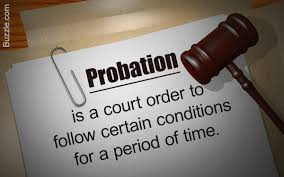 WHAT IS PROBATION?
WHAT IS PROBATION?
Judges have a number of different tools at their disposal when sentencing convicted offenders in Maryland. One of the most common sentencing options a judge may use is to impose a period of probation on a convicted offender.
Probation is a period of supervision over an offender, ordered by the court instead of serving time in prison.
When a person receives probation, the judge is basically saying that if strict conditions which are set by the judge are met and followed the person may remain in the community under supervision and avoid the jail time.
During that supervision, the person must adhere to the strict conditions imposed by the judge.
WHAT ARE SOME CONDITIONS THAT MAY BE IMPOSED BY THE JUDGE DURING PROBATION?
Some common conditions for probation include:
- Regular meetings with the probation officer
- Community Service
- Education and work commitments
- No alcohol consumption
- No firearms or other weapons possession
- Fines and financial restitution
- No contact with specific individuals
- No changing address without permission of the probation officer
Maryland’s statutory limit for probation is five (5) years, but judges have broad discretion when imposing probation.
WHAT HAPPENS IF I VIOLATE THE RULES OF MY PROBATION?
There are two kinds of violations of probation.
One is to violate the specific conditions of the probation that the judge set out for you during sentencing.
The second is a “technical” violation of probation. Technical violations are for things such as:
- showing up late for meetings with your probation officer,
- texting or leaving a voicemail rather than physically showing up for your meetings
- avoiding community service requirements
WHAT HAPPENS AT A VIOLATION OF PROBATION HEARING?
A violation of probation hearing is held to determine whether or not a parole violation occurred.
Maryland law states that the same judge who presided over the sentencing should preside over the hearing, when practical.
This hearing differs from a criminal hearing. It is conducted as a civil proceeding and the decisions will be made by a judge, not a jury. Instead of using the “beyond a reasonable doubt” standard, it will be judged on “preponderance of evidence” standard.
At the hearing, the defendant will either agree or deny that they have violated probation. If you deny, a full hearing is conducted and state’s witnesses will be heard – usually the probation officer or other witnesses – to give evidence to the court of the violation.
If the judge decides that a violation has occurred, the hearing goes to sentencing.
WHAT TYPE OF SENTENCING CAN BE IMPOSED ON A VIOLATOR OF PROBATION?
If you are found guilty of violating probation for conditions of your probation, you may receive up to your maximum previously suspended sentence. This will be at the discretion of the judge.
BUT…
The rules for probation violation sentencing changed in October 1, 2017 for “technical violations” – Rule 4 violations.
Previously, technical violations fell in the same category as violations of the conditions of your probation and might land you in jail to complete your sentence.
Technical violations are now governed by a statute that almost always must be followed by state judges.
Any defendant charged with a technical violation faces a maximum sentence of
- 15 days for a first offense
- 30 for a second offense
- 45 for a third
- and the full suspended time after that.
A judge still has the discretion to sentence differently if there is a danger to public safety, victim or a witness.
Technical violations include things such as:
- testing positive for drugs or alcohol
- missing ONE appointment – AVOIDING SUPERVISION IS A VIOLATION OF YOUR CONDITIONS
- showing up late to an appointment
- not completing treatment, community service or anger management
- failing to pay restitution, fines and court costs.
If you are charged with violating your probation, you may need the help of an attorney.
